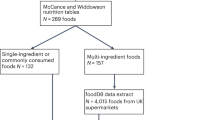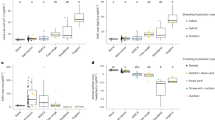Abstract
A QUESTION of some importance in the tropics is the reason for the superior ability of the indigenous, humped cattle, Bos indicus (zebus), to thrive on dry, coarse pasture compared with the European-type cattle, Bos taurus (grades). The differences between the two types in this respect have not been well defined or the causes intensively sought. Since the rumen microflora is readily adaptable to a particular diet, it is unlikely that the difference lies in the digestion of fibre in the rumen. Digestibility trials with the two types of animals have indicated that this may be correct and have suggested that a difference may exist in the simple gut.
This is a preview of subscription content, access via your institution
Access options
Subscribe to this journal
Receive 51 print issues and online access
$199.00 per year
only $3.90 per issue
Buy this article
- Purchase on Springer Link
- Instant access to full article PDF
Prices may be subject to local taxes which are calculated during checkout
Similar content being viewed by others
References
Nature, 178, 211 (1956).
Author information
Authors and Affiliations
Rights and permissions
About this article
Cite this article
QUARTERMAN, J., PHILLIPS, G. & LAMPKIN, G. A Difference in the Physiology of the Large Intestine between European and Indigenous Cattle in the Tropics. Nature 180, 552–553 (1957). https://doi.org/10.1038/180552a0
Issue Date:
DOI: https://doi.org/10.1038/180552a0
Comments
By submitting a comment you agree to abide by our Terms and Community Guidelines. If you find something abusive or that does not comply with our terms or guidelines please flag it as inappropriate.



